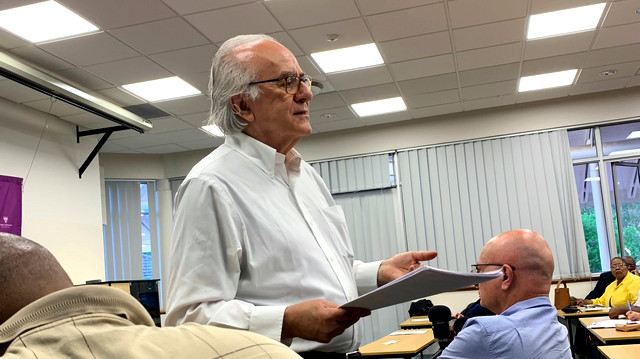
By Boitumelo Nte and Julian Jacobs, Journalism and Media Studies students
The Rhodes University School of Journalism and Media Studies (JMS) held the first of its final two seminars for the year on 14 October, with the much anticipated visit of University of Coimbra’s (Portugal) Sociology Professor Boaventura de Sousa Santos, at the Eden Grove Lecture Complex.
Professor de Sousa Santos addressed the 30th Mellon Anniversary sitting – a constituent event of the Andrew W Mellon Foundation’s 30th year of grant-funding in South African media practice – on the topic 'Southern Epistemologies: Thinking beyond the Abyss for a Transformative Curriculum'.
JMS Professor Lynnette Steenveld opened the event and said that Department’s conception of the seminar was inspired by Prof de Sousa Santos’ work on social and epistemic justice, and was considered a good opportunity for the University’s audience to explore the idea of ‘Southern Epistemologies’ that derive from spaces and people who are not recognised as sites and producers of knowledge.
Prof de Sousa Santos argued in his speech that universities must seriously consider the decolonisation debate as part of “a struggle for social and global justice, with which a justice of knowledges can be achieved”. He argued against the ongoing teaching of the “knowledge of the winners”, if tertiary institutions ever envisage to adopt decolonised curricular.
Prof de Sousa Santos spoke about politics, sociology, the economy, colonialism, capitalism, patriarchy, education, classism, indigenous knowledge systems and law as he weaved a web of constructive debates on these topics. He questioned university agendas in only teaching the knowledge of the winners.
“What about the others?” he asked. He expressed his concern about this by stating that there is no knowledge without ignorance. “If we continue to teach one knowledge to students, we ignore the other and this is a massive attack on the students’ self-esteem, as they won’t feel at home at universities.”
He argued that universities in general need an epistemic revolution and he stressed that Africa too has intellectuals. “Universities need to produce knowledge that combines science and knowledges born from struggle.”
He further spiced up his talk by stating that South Africa is still a colonial state, “You just changed the faces. And what is the point in changing the faces of power and not the structure? You can’t change anything unless you address the land question,” he concluded.

